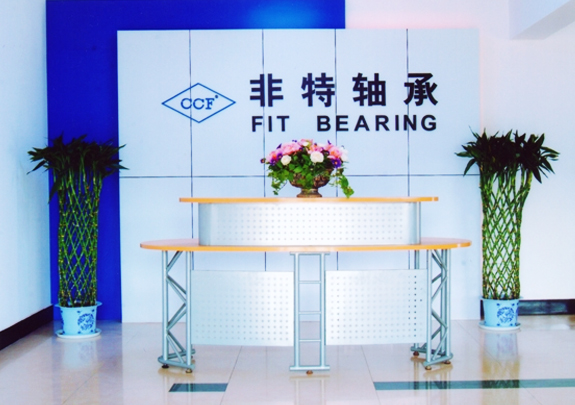Automobile Tensioner Bearings
VIEW DETAILS
CCF Team is scheduled to attend below Exhibitions:
1. The 25th China International Electric Motor Expo And Forum(July.13-15, 2024)
2. PTC ASIA 2024(Nov.5-8, 2024)
3. 2024 CHINA INTERNATIONAL BEARING INDUSTRY EXHIBITION (Nov.25-28, 2024 )
VIEW DETAILS
VIEW DETAILS
VIEW DETAILS
VIEW DETAILS
VIEW DETAILS
VIEW DETAILS
VIEW DETAILS
VIEW DETAILS
VIEW DETAILS

Zhejiang Fit Bearing Co., Ltd. was established in November 2003 with a registered capital of USD 2 million. The plant covers an area of 35,000 square meters and 20,000 square meters, with more than 120 workers and more than 20 technical management personnel.
At the beginning of its establishment, the company specialized in producing all kinds of low-noise long-life ball bearings. As a professional China Serious Bearings Manufacturers and Serious Bearings Factory, After years of development in the bearing industry, we have accumulated rich experience in production and management. In 2013, we began to vigorously develop agricultural machinery parts and construction machinery parts. At present, we have formed a team with exquisite technology and excellent management, capable of R&D, manufacturing, sales and service in the bearing industry and agricultural machinery parts. After years of hard work and development, we have formed a capable R&D and manufacturing team. They have rich knowledge and experience in materials, heat treatment, machining and grinding. There are currently 9 professional R&D engineers responsible for the development of new products.
Garden machinery bearings are indeed susceptible to damage from external factors during operation. Garden machinery is usually used in outdoor environ...
Read MoreMotorcycle bearings are subjected to constant wear and erosion from the external environment during long-term use, so their wear resistance and corros...
Read MoreWashing machine bearings need to meet multiple key performance requirements in design to ensure that they can operate stably and for a long time under...
Read MoreHeat treatment can significantly improve the hardness and wear resistance of stainless steel shafts. The hardening process is particularly important f...
Read MoreWhat are the fundamental principles behind Serious Bearings operation?
The fundamental principles behind Serious Bearings operation revolve around reducing friction and facilitating smooth rotation or movement between two components. Bearings are mechanical components that support the load and enable relative motion between two parts while minimizing friction and wear.
Load Support:
Bearings primarily serve to support loads, whether they are radial loads (perpendicular to the shaft) or axial loads (parallel to the shaft). The bearing design must be able to withstand these loads without excessive deformation.
Friction Reduction:
The primary purpose of bearings is to reduce friction between moving parts. Friction can lead to wear, heat generation, and energy loss.Bearings provide a low-friction interface, allowing smooth and efficient motion.
Rolling or Sliding Contact:
Bearings achieve their function through either rolling or sliding contact between the moving parts. Rolling bearings, such as ball bearings and roller bearings, use rolling elements to reduce friction. Plain bearings, on the other hand, involve sliding surfaces.
Distribution of Load:
Bearings distribute the applied load over a larger surface area,preventing concentrated stress on individual points. This distribution helps in preventing premature wear and failure.
Axis of Rotation:
Bearings facilitate rotation around a fixed axis. The design must ensure that the axis of rotation remains stable and that there is minimal deviation from the intended path.
Material Selection:
The materials used in bearings are chosen for their durability, load-carrying capacity, resistance to wear, and corrosion resistance.Common materials include steel, ceramics, and polymers.
Lubrication:
Proper lubrication is crucial for Serious Bearings operation. Lubricants reduce friction, dissipate heat, and prevent wear. The choice of lubrication method (grease or oil) depends on the application and operating conditions.
How do bearings contribute to reducing friction and energy consumption in rotating machinery?
Serious Bearings play a crucial role in reducing friction and energy consumption in rotating machinery. Friction is an inherent force that opposes motion between two surfaces in contact, and it can lead to energy losses in machinery. Bearings help minimize friction by providing a smooth interface between moving parts,
thereby improving the efficiency of rotating machinery.
Separation of Surfaces:
Serious Bearings introduce rolling elements (such as balls or rollers) between surfaces in contact, creating a rolling rather than sliding motion. This rolling action minimizes the direct contact between surfaces, reducing frictional resistance compared to sliding contact.
Rolling Contact vs. Sliding Contact:
The rolling contact in bearings generates less friction than sliding contact. In sliding contact, surfaces rub against each other, causing higher levels of friction and heat. Bearings transform this sliding motion into rolling motion, resulting in lower friction and less heat generation.
Load Distribution:
Bearings distribute loads evenly across their rolling elements, ensuring that the weight and forces acting on the rotating components are supported by multiple contact points. This load distribution minimizes localized pressure, reducing friction and wear on specific areas.
Efficient Lubrication:
Bearings are typically lubricated to further reduce friction and dissipate heat. Lubricants create a thin film between the rolling elements and raceways, preventing direct metal-to-metal contact. Proper lubrication ensures smooth operation and lowers the coefficient of friction.
Low Rolling Resistance:
The design of bearings focuses on minimizing rolling resistance. This involves selecting appropriate materials, optimizing bearing geometry, and reducing internal clearances. Low rolling resistance contributes to energy efficiency in rotating machinery.
Precision Manufacturing:
High-precision manufacturing techniques ensure that bearing components are accurately shaped and properly aligned. Precision helps maintain optimal clearances, reducing unnecessary friction and ensuring smooth operation.